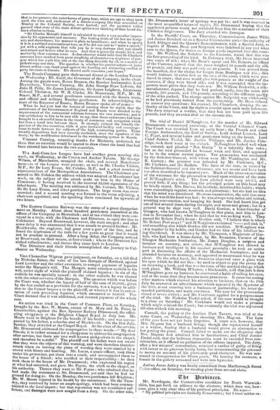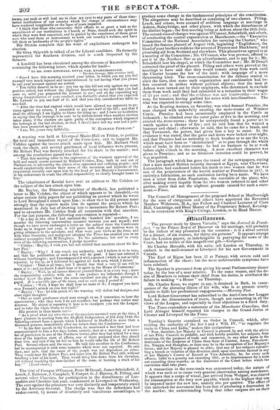gbe Vrobintes.
Mr. Newdegate, the Conservative candidate for North Warwick- shire, has put forth an address to the electors; which does not, how- ever, give a very clear idea of his political principle& He says- ., My political principles are decidedly Conservative; but I trust neither ex- treme, nor such as will lead me to close my eyes to anyparts of those time- tested institutions of our country which the change of circumstances may have rendered inapplicable or the lapse of years impaired. " I think that those who consecrate their efforts to so great a task as the amendment of our institutions in Church or State, should seek the spirit in which they were first conceived, and be guided by the experience of those great men who used them as instruments to work our country's welfare, and have left them as landmarks of the people's rights." His friends complain that his want of explicitness endangers his election.
Sir Grey Skipwith is talked of as the Liberal candidate. He formerly represented the Southern division, and is much respected by the farmers.
A handbill has been circulated among the electors of Knaresborough, containing the following letter, which speaks for itself-
" TO MR. JOHN RIDSDALE, ROYAL OAR, IINARESBOROUGH.
" Harden Grange, 25th October 1842. " Sir—I have this morning received your letter, in which you say you feel yourself very much injured and inconvenienced by not having what you please to call your account against me settled. " You richly deserve to be so : you ran up this bill not only against my most positive orders, but without the slightest knowledge on my part that you had cone so until you presented the account to me ; and on my expressing any strong disapprobation of your conduct, you distinctly stated that you expected Mr. Lawson to pay one-half of it, and that you only considered me liable to one-halt
" After the time had expired which would have allowed my opponent to pe- tition against my return, I consented to pay one-half of the bill; and that I shall do, although I am highly to blame for doing so : and I have no hesitation in saying that the borough is as sure to be disfranchised when another election takes place, if the electors are again guilty of the corruption which disgraced the borough at the last election, as that I should have lost my seat had a peti- tion been presented against me. " I am, Sir, yours very faithfully, W. BUSFIELD FERRAND."
A meeting was held at Liverpool Music-Hall on Friday, to petition for total and immediate repeal of the Corn-laws, and to support Mr. Cobden against the recent attack made upon him. Mr. Richard theil took the chair, and several gentlemen of local influence were present. Sir Robert Peel was fiercely attacked for his share in the matter ; and among the resolutions passed was this-
" That this meeting unite in the expression of the warmest approval of the bold and manly course pursued by Richard Cobden, Esq., both in and out of Parliament, in advocating the claims of an oppressed and suffering people ; and would emphatically declare their sense of the meanness and injustice of the imputation recently cast upon him by the head of her Majesty's Government, in his endeavours to evade the official responsibility so clearly brought home to him."
The inhabitants of' Kendal have sent an address to Mr. Cobden on the subject of the late attack upon him.
Mr. Bayley, the Dissenting minister of Sheffield, has published a letter to Mr. Cobden, the object of which appears to be threefold,—to abuse certain daily papers for not publishing an answer which he wrote to Lord Brougham's attack upon him ; to show that he did protest more strongly than the reports made him do against the project which he mentioned in July last of drawing lots to assassinate Sir Robert Peel ; and to exonerate Mr. Cobden from all connexion with that anecdote. For the last purpose, the following conversation is repeated-
" In a day or two after I bad narrated the hundred lots' anecdote, I re- member the following conversation occurred between you and myself; and though we have never exchanged a letter on the subject since the Conference broke up in August last year, it will prove both what my motives were in giving utterance to the anecdote, and what were your views at the time, and with what blustering and malignant calumny the Times has assailed you as an indirect accomplice with M'Naughten. To the substance, but not to every term of the following conversation, I pledge myself-
" Cobden : 'Bayley, I wish you had not related that anecdote about Sir Ro- bert Peel.'
" Bayley: Why ? I can vouch my authority, and I believe it to be true, and that the publication of such a fact will do good. I have not uttered it without forethought ; and I accompanied it with a protest (which is not as fully reported, by the by, as 1 delivered it) against all such acts, which 1 detest.' " Cobden : That is all true ; but I should fear that a very ill use will be made of it ; and no doubt I shall hear of it again in the House of Commons.' " .Bayley : ' Well, by all means dissever yourself from it in every way ; leave the responsibility entirely with me. I can produce my informant, though I neither know the place where the scene occurred nor any of the persons en- gaged. It is a terrible sign of the times, and as such only I quoted it,'
" Cobden : Well, I hope we shall hear no more of it ; 1 suppose you have seen Ferrand's attack on you last night ?'
" Bayley : Yes : let him prank it ; the warning will defeat bad designs, and start right thoughts.'
"One or more gentlemen stood near enough to us, I remember, to hear the conversation ; who they were I do not recollect, but perhaps this notice may discover. My object in repeating it bete is to exculpate you and the League, and to take the whole blame to myself."
His protest is thus made out-
" As a proof what my own views of the anecdote narrated were at the time, I have pleasure in quoting from the Sheffield Independent, of 23d July 1842, the following extract from a speech which I delivered in Sheffield to more than a thousand persons, immediately after my return from the Conference-
" In his first speech in the Conference, he mentioned a fact that bad been communicated to him a few days before, namely, that at a meeting of a num- ber of gentlemen in one of the Northern towns, after they had talked for a long time of the hopeless state of affairs, one of them proposed that they should draw lots, and said if the lot fell on him he would take the life of Sir Robert Peel. Several others said the same. He told this anecdote in the Conference, bat he accompanied it with some remarks which were not reported. He said then, and now, that the cause of the people was not dependent on crime. They would beat Sir Robert Peel, and leave him Sir Robert Peel still, without touching a hair of his head. They would bring him down from his elevation, yet without touching the shoe-latchet of the man, or burning a stack of his hay.'" (Loud cheers.) The trial of Feargus O'Connor, Peter M'Douall, James Scholefield, J. Leech, J. Bairstow, J. Campbell, T. Cooper, G. J. Harney, R. Piling, and several other Chartists, for participation in the disturbances of Lan- cashire and Cheshire last year, commenced at Liverpool on Wednesday. The case against the prisoners was very distinctly and temperately stated by the Attorney-General. The charge was, that the defendants had endeavoured, by means of disorderly and tumultuous assemblages, to
produce some change in the fundamental principles of the constitution. The allegations may be described as consisting of two classes. Pilling, Leech, and others, were accused of seditious language at meetings in Ashton, Staleybridge, and other places, with which the disturbances of the district began ; the first meeting being at Ashton about the 26th July. The second class of charges was against O'Connor, Scholefield, and others, of conducting the central organization at Manchester,—the " Executive Committee of the National Association for carrying the Charter," who issued the famous placard of August 16th, beginning "Englishmen, the blood of your brothers reddens the streets of Preston and Blackburn," and promising aid from Scotland and elsewhere. This placardwas agreed to at a meeting of the Committee ; Mr. O'Connor, who was present, offered to put it in the Northern Star as an advertisement, and to pay for it ; Mr. Scholefield lent his chapel, at which the Committee met ; Mr. MIDonall corrected the proof of the placard. Pilling and others were proved at the meetings to have said that they would remain away from work until the Charter became the law of the land; with language of a more threatening kind. The cross-examination for the defence tended to elicit the facts, that some such organization and combination had_be- fore occurred in strikes without political objects ; that the men at Ashton were turned out by their employers, who threatened to exclude them from work until they had submitted to a reduction in their wages of 25 per cent ; and that the evidence was not trustworthy—one wit- ness, for instance, having garbled his notes with interlineations. The trial was expected to occupy some time.
At the Reading Assizes, on Saturday, was tried Samuel Prentice, the man charged with unlawfully entering the store-rooms of Windsor Castle. Prentice had been occasionally employed in the Castle as locksmith : he climbed over the outer gates at five in the morning, and entered the store-rooms ; there he unexpectedly found a porter set to watch against a chance of fire ; and he told him that he wanted a hammer and chisel ; afterwards he said, that he came for a brush, and that Townsend, the porter, had given him a key to enter. In the evidence it was stated, that the gates and doors were locked over-night, and that Prentice had no authority to fetch brushes or to use the keys, which must have been so " skeletonized" as to pass through the whole suite of locks in the store-rooms : he had no business to be at work before eight o'clock in the morning. A most excellent character was given to Prentice ; and as no felonious intention could be proved, he was acquitted.
The paragraph which has gone the round of the newspapers, stating that a man named Holden recently deceased at Egypt, near Chowbent, Lancashire, had confessed before his death to two women that he was one of the perpetrators of the horrid murder at Pendleton in 1817, is entirely a fabrication, no such confession having been made. We have seen a letter from John Pemberton, the constable of the place, who, after making every inquiry from the two women referred to and other parties, states that not the slightest grounds existed for such a state- ment.— Times.
The Council of Management of the proposed School at Marlborotigh for the sons of clergymen and others have appointed the Reverend Matthew Wilkinson, M.A., late Fellow and Classical Lecturer of Clare Hall, Cambridge, and Head Master of the Proprietary School, Kensing- ton, in connexion with King's College, London, to be Head Master.



























 Previous page
Previous page